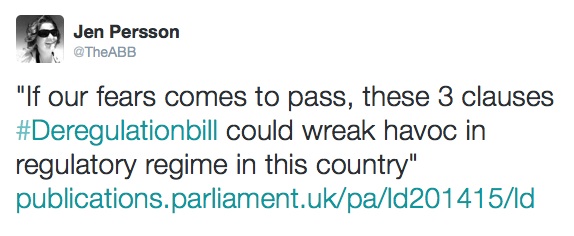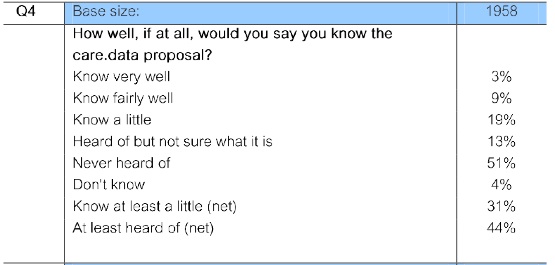They say ‘every little helps’. care.data needs every little it can get.
In my new lay member role on the ADRN panel, I read submissions for research requests for any ethical concerns that may be reflected in wider public opinion.
The driving force for sharing administrative data research is non-commercial, with benefits to be gained for the public good.
So how do we quantify the public good, and ‘in the public interest’?
Is there alignment between the ideology of government, the drivers of policy [for health, such as the commissioning body NHS England] and the citizens of the country on what constitutes ‘the public good’?
There is public good to be gained for example, from social and health data seen as a knowledge base, by using it using in ‘bona fide’ research, often through linking with other data to broaden insights.
Insight that might result in improving medicines, health applications, and services. Social benefits that should help improve lives, to benefit society.
Although social benefits may be less tangible, they are no harder for the public to grasp than the economic. And often a no brainer as long as confidentiality and personal control are not disregarded.
When it comes to money making from our data the public is less happy. The economic value of data raises more questions on use.
There is economic benefit to extract from data as a knowledge base to inform decision making, being cost efficient and investing wisely. Saving money.
And there is measurable economic public good in terms of income tax from individuals and corporations who by using the data make a profit, using data as a basis from which to create tools or other knowledge. Making money for the public good through indirect sales.
Then there is economic benefit from data trading as a commodity. Direct sales.
In all of these considerations, how does what the public feels and their range of opinions, get taken into account in the public good cost and benefit accounting?
Do we have a consistent and developed understanding of ‘the public interest’ and how it is shifting to fit public expectation and use?
Public concern
“The importance of building and maintaining trust and confidence among all stakeholder groups concerned – including researchers, institutions, ethical review boards and research participants – as a basis for effective data sharing cannot be overstated.” [Wellcome blog, April 2015]
If something is jeopardising that public good it is in the public interest to say so, and for the right reasons.
The loss of public trust in data sharing measured by public feeling in 2014 is a threat to data used in the public interest, so what are we doing to fix it and are care.data lessons being learned?
The three biggest concerns voiced by the public at care.data listening events[1] were repeatedly about commercial companies’ use, and re-use of data, third parties accessing data for unknown purposes and the resultant loss of confidentiality.
Question from Leicester: “Are we saying there will be only clinical use of the data – no marketing, no insurance, no profit making? This is our data.” [NHS Open Day, June 2014]
While people are happy for the state to use their data without active consent for bona fide research, they are not for commercial purposes.
Much of the debate and upset caused by the revelations of how our hospital episode statistics were managed in the past centred on the sense of loss of ownership. And with that, the inability to consent to who uses it. This despite acknowledgment that patients own their data.
Significant concern centres on use of the information gleaned from data that patients consider commercial exploitation. For use segmenting the insurance markets. For consumer market research. Using data for individual targeting. And its utter lack of governance.
There is also concern about data being directly sold or exchanged as a commodity.
These concerns were raised meeting after meeting in the 2014 care.data “listening process.”
To read in Private Eye that commercially sensitive projects were discussed in various meetings between NHS England and supermarket giant Tesco throughout 2014 [2] by the Patients and Information Director, responsible for care.data, is therefore all the more surprising.
They may of course be quite unrelated.
But when transparency is the mother of trust, it’s perhaps a surprising liason while ‘listening’ to care.data concerns.
It could appear that greater confidentiality was given to the sensitivity of commercial meetings than citizens’ sensitive data.
Consent package deals may be a costly mistake
People are much more aware since care.data a year ago, that unknown third parties may access data without our consent.
Consent around secondary NHS data sharing and in wider fora is no longer an inconvenient ethical dilemma best left on the shelf, as it has been for the last 25 years in secondary use, dusted off in the care.data crisis. [3]
Consent is front and centre in the latest EU data protection discussions [4] in which consent may become a requirement for all research purposes.
How that may affect social science and health research use, its pros and cons [5] remain to be seen.
However, in principle consent has always been required and good practice in applied medicine, despite the caveat for data used in medical research. As a general rule: “An intervention in the health field may only be carried out after the person concerned has given free and informed consent to it”. But this is consent for your care. Assuming that information is shared when looking after you, for direct care, during medical treatment itself is not causes concerns.
The idea is becoming increasingly assumed in discussions I have heard, [at CCG and other public meetings] that because patients have given implied consent to sharing their information for their care, that the same data may be shared for other purposes. It is not, and it is those secondary purposes that the public has asked at care.data events, to see split up, and differentiated.
Research uses are secondary uses, and those purposes cannot ethically be assumed. However, legal gateways, access to that data which makes it possible to uses for clearly defined secondary purposes by law, may make that data sharing legal.
That legal assumption, for the majority of people polls and dialogue show [though not for everyone 6b], comes a degree of automatic support for bona fide research in the public interest. But it’s not a blanket for all secondary uses by any means, and it is this blanket assumption which has damaged trust.
So if data use in research assumes consent, and any panel is the proxy for personal decision making, the panel must consider the public voice and public interest in its decision making.
So what does the public want?
In those cases where there is no practicable alternative [to consent], there is still pressure to respect patient privacy and to meet reasonable expectations regarding use. The stated ambition of the CAG, for example, is to only advise disclosure in those circumstances where there is reason to think patients would agree it to be reasonable.
Whether active not implied consent does or does not become a requirement for research purposes without differentiation between kinds, the public already has different expectations and trust around different users.
The biggest challenge for championing the benefits of research in the public good, may be to avoid being lumped in with commercial marketing research for private profit.
The latter’s misuse of data is an underlying cause of the mistrust now around data sharing [6]. It’s been a high price to pay for public health research and others delayed since the Partridge audit.
Consent package deals mean that the public cannot choose how data are used in what kids of research and if not happy with one kind, may refuse permission for the other.
By denying any differentiation between direct, indirect, economic and social vale derived from data uses, the public may choose to deny all researchers access to their all personal data.
That may be costly to the public good, for public health and in broader research.
A public good which takes profit into account for private companies and the state, must not be at the expense of public feeling, reasonable expectations and ethical good practice.
A state which allows profit for private companies to harm the perception of good practice by research in the public interest has lost its principles and priorities. And lost sight of the public interest.
Understanding if the public, the research community and government have differing views on what role economic value plays in the public good matters.
It matters when we discuss how we should best protect and approach it moving towards a changing EU legal framework.
“If the law relating to health research is to be better harmonised through the passing of a Regulation (rather than the existing Directive 95/46/EC), then we need a much better developed understanding of ‘the public interest’ than is currently offered by law.” [M Taylor, “Information Governance as a Force for Good? Lessons to be Learnt from Care.data”, (2014) 11:1 SCRIPTed 1]
In the words of Dr Mark Taylor, “we need to do this better.”
How? I took a look at some of this in more detail:
Part two: The Economic Value of Data vs the Public Good? [2] Pay-for-privacy and Defining Purposes.
Part three: The Economic Value of Data vs the Public Good? [3] The value of public voice.
Update note: A version of these three posts was combined into an opinion piece – care.data: ‘The Value of Data versus the Public Interest?’ published on StatsLife on June 3rd 2015.
****
image via Tesco media
[1] care.data listening event questions: https://jenpersson.com/pathfinder/
[2] Private Eye – on Tesco / NHS England commercial meetings https://twitter.com/medConfidential/status/593819474807148546
[3] HSCIC audit and programme for change www.hscic.gov.uk/article/4780/HSCIC-learns-lessons-of-the-past-with-immediate-programme-for-change
[4] EU data protection discussion http://www.digitalhealth.net/news/EHI/9934/eu-ministers-back-data-privacy-changes
[5] Joint statement on EU Data Protection proposals http://www.wellcome.ac.uk/stellent/groups/corporatesite/@policy_communications/documents/web_document/WTP055584.pdf
[6] Ipsos MORI research with the Royal Statistical Society into the Trust deficit with lessons for policy makers https://www.ipsos-mori.com/researchpublications/researcharchive/3422/New-research-finds-data-trust-deficit-with-lessons-for-policymakers.aspx
[6b] The ‘Dialogue on Data’ Ipsos MORI research 2014 https://www.ipsos-mori.com/researchpublications/publications/1652/Dialogue-on-Data.aspx – commissioned by the Economic and Social Research Council (ESRC) and the Office for National Statistics (ONS) to conduct a public dialogue examining the public’s views on using linked administrative data for research purposes,
[7] AdExchanger Janaury 2015 http://adexchanger.com/data-driven-thinking/the-newest-asset-class-data/
[8] Tesco clubcard data sale https://jenpersson.com/public_data_in_private_hands/ / Computing 14.01.2015 – article by Sooraj Shah: http://www.computing.co.uk/ctg/feature/2390197/what-does-tescos-sale-of-dunnhumby-mean-for-its-data-strategy
[9] Direct Marketing 2013 http://www.dmnews.com/tesco-every-little-bit-of-customer-data-helps/article/317823/
[10] Personalisation in health data plans http://www.england.nhs.uk/iscg/wp-content/uploads/sites/4/2014/01/ISCG-Paper-Ref-ISCG-009-002-Adult-Social-Care-Informatics.pdf
[11] Tim Kelsey Keynote speech at Strata November 2013 https://www.youtube.com/watch?v=s8HCbXsC4z8
[12] Forbes: Illumina CEO on the US$20bn DNA market http://www.forbes.com/sites/luketimmerman/2015/04/29/qa-with-jay-flatley-ceo-of-illumina-the-genomics-company-pursuing-a-20b-market/







